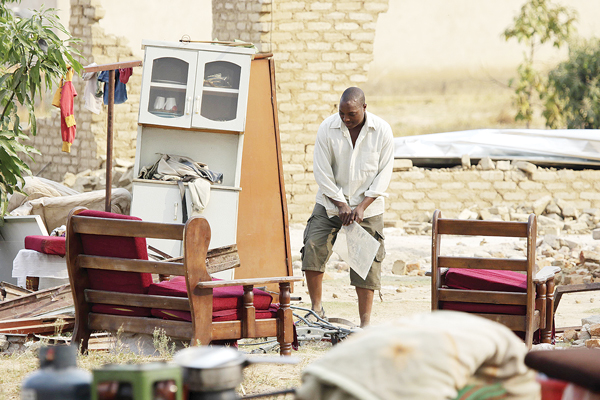
Many urban dwellers have suffered depression, collective hysteria and pervasive feelings of hopelessness and desperation following the demolition of their houses. Of late, anxiety, fear, stress and panic attacks have been associated with demolitions which were carried out by local authorities.
Johannes Marisa
What is surprising is that Harare has a housing deficit of about 1,3 million people, meaning there is already overcrowding considering the current accommodation situation in the city.
Many people have been duped by those in offices into paying a lot of money for stands in places that were not designated for housing development, resulting in their properties being demolished.
Surprisingly, some of the fraudsters are still in their offices while the victims are languishing in the open.
No efforts have been made to reimburse the money which was paid to the so-called land barons. In 2016, Harare City Council obtained 23 court rulings against housing co-operatives, 16 of which were at Crowborough Farm.
Demolishing all the affected structures would mean more than 20 000 people will be affected directly or indirectly with serious consequences on their health.
Public health is the science of protecting the safety and improve the health of communities through education, policy making and research for disease and injury prevention. Communities require health promotion, research, health education.
- Chamisa under fire over US$120K donation
- Mavhunga puts DeMbare into Chibuku quarterfinals
- Pension funds bet on Cabora Bassa oilfields
- Councils defy govt fire tender directive
Keep Reading
In 2015, the United Nations General Assembly came up with 17 Sustainable Development Goals which were supposed to be achieved by 2030. While goal number 3 deals with good health and wellbeing, goals 1 and 6 talk about elimination of poverty and provision of clean water and sanitation respectively. Poverty is difficult to eliminate among the population if there are continuous threats of demolitions of shelter.
Who can invest in an area that has been under threat of demolition since 2016?
Why make people develop anxiety disorders because of threats of demolitions?
A clear regularisation and formalisation plan should be in place instead of concetrating on dispossessions, forced evictions and destruction of houses which has serious social and health consequences.
We are all human and our conscience should guide us so that we are considerate, indulgent and empathic as we deal with such a delicate issue. Stress-aggravated illnesses like hypertension have often worsened in many patients who had their houses destroyed after spending all their hard-earned incomes on construction.
A majority of these people went through proper channels in applying for land, only to realise that they were deceived into paying for undesignated land. Hoodwinking has been the norm in our country perpetrated by the same culprits who are walking scot-free.
What is disturbing is that the so-called land barons are easily released by the courts because they have the resources to engage top-class lawyers to represent them using money they would swindled the poor home-seekers.
This is sad and my prayer is that President Emmerson Mnangagwa will address this issue once and for all.
There are many hygiene-related diseases which can be aggravated by poor living conditions and these include typhoid, dysentery, cholera, tuberculosis and lately COVID-19.
While we appreciate that proper urban planning was necessary in the first place, it is all history and focus should now be on how to rectify the situation.
Not all settlements are squalid, some are well-planned and habitable with all the necessary infrastructure like roads, sewer systems, electricity and water.
Lack of proper policy seems to hinder urban development in the country.
Conflicts seem to be taking centre stage in development issues.
There are many areas that have potential for growth around Harare and Melfort is a good example.
The area is just a stone’s throw away from Harare and lies along Mutare Road to the east of Harare.
I visited the area last year and realised that the land managers were quite organised with pegs in situ and standard plans available.
No makeshift structures were allowed.
People were not asked to pay a lot of money and it was said that close to 1 500 people would benefit from the area.
The area only needs someone in government to authorise development. With such state-of-the-art houses being built, can demolition be the solution?
Why not pursue the regularisation path which will surely advantage our fellow countrymen unlike continuing to issue unnecessary demolition threats?
Why should we rejoice when someone suffers yet we are all Zimbabweans?
How can we eliminate poverty as stipulated by Sustainable Development Goal number 1 when we are so retrogressive?
We need policy consistency to avoid loss of citizens from stress and depression-aggravated illnesses like strokes and hypertension.
Many people committed suicide because they could not cope with stress. Surely, demolitions are a threat to humanity!
It is, therefore, imperative that in cases of conflicting rights on some land, the State should intervene to protect its citizens. There is more than enough State land in our country.
The Banjul Charter on Human and People’s Rights of 1981 recognises the right to shelter, education, health, among others.
Let us all unite for the betterment of our great nation.
- Johannes Marisa is president of the Medical and Dental Private Practitioners Association of Zimbabwe. He writes here in his personal capacity.











